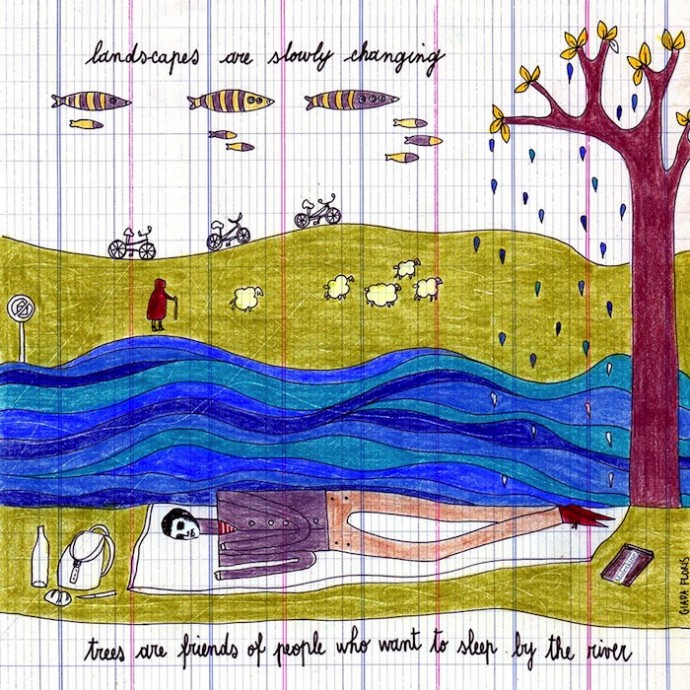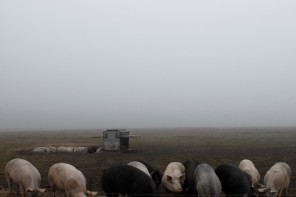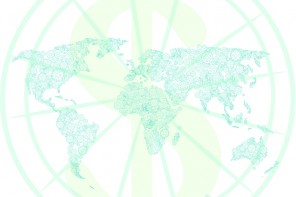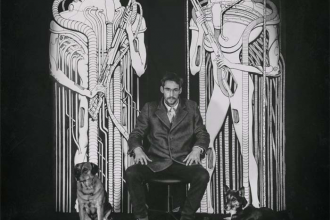The other side of the world is just a few hours away. As we occupy ourselves with the in-flight meal and movie, 10,000 metres below whole nations, cultures, ways of life rush by. Marco Gargiulo, 27, is currently living with his family in Rome. In 2012, he cycled from Edinburgh to Nepal. He shares his story with Sensa Nostra.
We started as three, a German guy, a Spanish guy and me. We had absolutely no plans. We didn’t know where we were going, we didn’t know how long we’d be there, in the end it was 11 months. One week before we left we bought a tent, we started fixing the bikes so they were ready. We looked at a map, just to get an idea, but we never really followed any route, because you can’t be so strict in a journey like this. We just said we’re going to go South East, let’s see if we reach India, if we reach Nepal, if we reach Bhutan.
On the way, it was like a caravan. As we travelled we met other people doing the same thing as us; people joined and left so that we were sometimes 2, 3, 4 or 5, a caravan going South East.
When you go by bike you go so slowly you really see things starting to change. As you travel you see landscapes are changing, buildings are changing, the colour of the people is changing, societies are changing.
The change is slow, but when you go by bicycle, you live in every single place, and you can see this change. It’s not like boom, suddenly you’re in Bangkok, and you think how can people live like this, how can people eat like this.
You see the links. You see how it is being shaped, the direction it is going, you’re never afraid of the new culture because you’re following this river and you’re not scared of changes because they’re slow and you have the time for your mind and body to adapt.
During the trip I got very interested in migratory people. I met many nomad tribes on my way, the most interesting one was in the mountains in Iran. They have sheep and cows, and they move with the weather for themselves and for the needs of their animals. I spent three days with them. In the beginning I said, these people must be crazy, living all their life in the way that I lived one year, because the view of life is so different.
My feeling was of admiration, because I felt it was so hard to live like this. Maybe these people had never had a different life so they don’t even question it, but I found it very hard. You need lots of constants, you need things to be consistent, and you need a lot of strength inside you, physical of course, but mental strength is most important.
It’s very hard to always keep going, every day, entering a sort of routine that you create in your own head and becomes your life for that period. I faced the experience in this way. In the same way as I’m living now, or I was living before in Edinburgh, doing the same thing every day. I knew that in the morning I was waking up, doing some stretching, some reading, back on the bike for 5, 6, 7 hours, finding a place to sleep before dark, finding wood to build a fire. These were the tasks we had to do every day.
People say responsibility in your life would be taking care of the kids or going to work every day. It can sound a bit sarcastic but it was the same for us, our responsibilities were keeping going with these everyday tasks. For example, my friend was very good at navigation, this was his responsibility. I was very good at speaking to people, getting directions, being invited into a home, invited for something to eat. Everybody had his own role and responsibility, just as in everyday life.
After a little bit, there was one day, we were following the Danube for some time and quite often we slept on the banks of the river. So I woke up, it was already quite cold so it was a bit misty, and I went to touch the water, to speak with the Danube.
It was never like these people that go around hugging trees, that’s too much. I’ve lived in an eco village, in a setting where I was very in contact with nature, but I found doing this I was so much more exposed to the natural environment. You don’t have a house, you don’t have a concrete world, a shelter, what shapes your way of living is the natural environment around you.
For example sometimes it was very cold and very humid, especially if you sleep close to a river. You need to sleep close to rivers because it’s even colder in the mountains and you don’t want to cycle in the mountains. So you follow rivers.
You want to sleep dry because when it’s very humid, you don’t sleep well and when you cycle for 5 or 6 hours a day you need to rest. So if nature puts a big tree there, you know that you can camp under the tree because it will suck all the humidity out of the air and it will be dry all around it, and you will have a good night’s sleep.
You start to live together with nature much more than when you live a normal life. You start to understand nature much more, to respect nature much more. You don’t have a house; you don’t have anything constant, so that a tree or a river makes a huge difference. You are very dependent on it in a way.
Once you start and you go for a long time, it is very hard to stop. As the distance increases you galvanise yourself, and you are galvanised by the people you meet along the way. In the end I was travelling on my own in Nepal, I wanted to go to China, but it was impossible to go north through Tibet, and to go East I couldn’t cross the border by bicycle, I had to take a plane. But I said to myself, if I need to take a plane, I’m going back to Europe. This is my plane. After all that time it was a very hard decision.
I’m now in the opposite period, a period of being consistent, with feet on the ground. This comes from the experience of moving a lot in the past, but also because of my age, you start to see your life and direction in a different way. If you said to me, lets go to Africa, cycling around for three months, I would say no. I’m not going to move now. I want to be in one place. When the feelings come back, and I know they will come again, then we’ll see.
We tend to judge a lot, but after this experience I don’t need to judge any more. If you live in one place, and go about your life, of course there are inputs from the outside, but there are not that many. The amount of inputs during this trip was so huge, and I never stopped, I didn’t have time to process everything I’d seen and experienced and done, so that when I finally stopped it all came back to me and I was depressed for three months.
When you live slowly like this, you live and you see lots of changes. And you also need time to process all these inputs that are coming from outside.
It was never about escape, or about finding yourself, or being free. It was just about living. Choosing the way that you want to live a period of your life. We were just a caravan going South East, nobody telling us you need to live like this or like that, because there are people that don’t do this, they don’t just say yes, they are people that want to experience something different. And they live this period as a normal period of their life, not something amazing they feel they need to do.
All the time, people do things we think are amazing and when you ask them, they say they’re just doing it. And when you’re doing it, it’s not that impossible, it’s not that amazing, we are all able. That’s the right answer. I’m just doing it.







